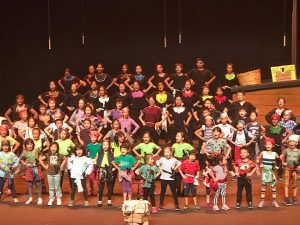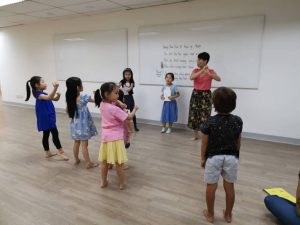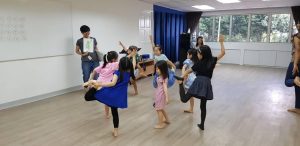Choral Training in the Early Years
Susanna Saw, choral music educator, Malaysia
Typically, we think of children’s choirs as those whose members are between 6 and approximately 18 years old – the school age group. Their concentration span is longer than that of younger children and they are quicker to pick things up. They are capable of performing at competitive levels; indeed, some of the top choirs in the world are children’s choirs!But what about children under 6 years old? Can they sing in a “choir” too? To answer this, let us imagine a world in which our ideal choir exists. For most of us, the ideal chorister would be one who is musically literate. “Literate” in this sense refers to the ability to look at a musical score and “think” sound – to be able to read and write music as easily as words. Often this comes from a long process of musical training that starts from a very young age.
Music education often begins at home, where a child’s first contact with music usually comes in the form of parents singing them lullabies as babies and creating musical activities with them as toddlers. During nursery and kindergarten, children may further experience systematic musical training that helps them develop a sensitivity to music. This early groundwork prepares a child for the more formalised types of music training that they may encounter as they grow older, such as playing instruments or choral singing at a more advanced level.
In other words, yes, children under the age of 6 can, and should, sing in a choir! It is of great benefit to their development.

Choral training for children between the ages of 3 and 6 falls into the category of early childhood music education. The goals of any such training in these early years should be to stimulate the child’s interest in music, to encourage relaxed, natural vocalisation and rhythmic movement, and to expand the child’s emotional stability through music. Learning should be fun, yet it should have a well-planned teaching sequence without the pressure of performance. Famous Hungarian music educator Zoltán Kodály considered singing the most natural form of music-making, since one’s voice is one’s most natural instrument. The early childhood years are actually a very important stage for establishing a good foundation in music. It is highly recommended that children aged 3 to 6 take part in choir sessions that promote the fundamental principles of singing and listening.
Children should be guided to form their musical tastes and aesthetic sensitivity by developing an ear for music as well as a good sense of rhythm and movement. At this age, children do not need complicated dance steps. Aim for simpler, dance-like movements rather than more complex choreography – this will help them with motor coordination and rhythmic feeling.Songs for children’s choirs should be carefully selected for teaching purposes, ideally with the teaching sequence in mind. The children should be accustomed to singing in tune; they should also learn to find enjoyment in attentive listening. When choosing the repertoire, the teacher must have a balanced number of rhymes, singing games, traditional songs, and songs specially composed for children. In these early formative years of music lessons, a selection of valuable, high-quality music to listen to is equally important.
“Everyone prefers the kind of music which he came to know in childhood. Good taste developed early is difficult to ruin. Therefore, we must be careful about first impressions. Their effects can be felt for a lifetime.” (Kodály)
During early childhood music training sessions, singing is always accompanied by games or paired with movement. Such physical activities help children to express their thoughts and feelings, which increases their enjoyment. Regular, repeated movement allows a child to feel the internal beat of the music and develop their sense of security. Subsequently, the child will be able to develop their skills in spontaneous creativity with variations on songs and games, such as performing the melody in a new way. It is important to note that at this age, we are not teaching children music theory or music improvisation; instead, we are helping them to connect the musical elements they are learning with their daily activities.
Games and songs affect a child’s emotions. Through group games, smaller circles of friends emerge, and the child’s relationship with their classmates and teachers strengthens their overall enjoyment of the music. Group activities allow children to develop self-confidence and overcome their self-consciousness; they become braver and more independent. A balance between individual and group activities in class helps foster self-discipline and cultivates a sense of community that shapes the children’s attitudes.The planning of early childhood teaching sequences must take into account the child’s physical and intellectual development, and relevant concepts should be introduced at appropriate stages throughout the early years. Programmes for this age group should integrate cognitive, instructional and pedagogical factors. Educators working with early childhood groups should also be experienced teachers with a good understanding of effective teaching methods.
In these times, it is important for teaching to incorporate a variety of techniques, whether face-to-face or online, especially since hybrid teaching has become a way of life. For young children, stereotypical teaching should be avoided – this requires teachers to continuously improve their skills, even if it means stepping out of their comfort zones. With experience, teachers will develop their own versions of effective teaching techniques that will give pleasure both to themselves and to their students.Working with young children can be challenging, requiring much pedagogical forethought. However, it is the most essential stage in music teaching, as it provides the foundations for a child’s musical journey. By combining their conducting knowledge with pedagogical approaches, choral conductors can help children in these early formative years to develop a love for music that will last a lifetime, setting the stage for even greater musical adventures to come.
 Susanna Saw is an active music educator promoting music and choral education in Malaysia. She is a lecturer and choir director in the Faculty of Music at the University of Malaya and at the Malaysian Institute of Art. In 2007, Susanna established the Young Choral Academy in Kuala Lumpur, a venue for choral lovers and teachers to learn more about vocal and choral education. Susanna has been regularly invited to be a member of the jury for various international choir festivals. She is an active member of the Working Committee for the Asia-Pacific Choral Council, under the auspices of the International Federation of Choral Music. She is also one of the founding members of the International Choral Conductors Federation and a member of the Advisory Board of CHORALSPACE Academy. She is currently vice-president of the International Kodály Society, the World Youth and Children Choral Artists’ Association, and the Malaysian Association for Music Education. https://youngchoral.com
Susanna Saw is an active music educator promoting music and choral education in Malaysia. She is a lecturer and choir director in the Faculty of Music at the University of Malaya and at the Malaysian Institute of Art. In 2007, Susanna established the Young Choral Academy in Kuala Lumpur, a venue for choral lovers and teachers to learn more about vocal and choral education. Susanna has been regularly invited to be a member of the jury for various international choir festivals. She is an active member of the Working Committee for the Asia-Pacific Choral Council, under the auspices of the International Federation of Choral Music. She is also one of the founding members of the International Choral Conductors Federation and a member of the Advisory Board of CHORALSPACE Academy. She is currently vice-president of the International Kodály Society, the World Youth and Children Choral Artists’ Association, and the Malaysian Association for Music Education. https://youngchoral.com
Edited by Kelly Harrison, USA

